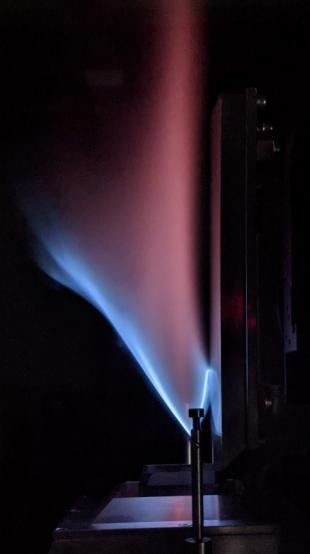Flame-wall interactions (FWI) play an important role for the design of cleaner propulsion systems such as aero- and automotive engines. Especially for the development of hybrid-electric systems, engine chambers will become smaller and operate at higher pressures. These requirements increase flame-wall interactions, which lead to increased heat transfer and flame quenching.
This funded PhD studentship provides an exciting opportunity to study flame-wall interactions using advanced laser diagnostics. The PhD will be working as part of a team that is providing fundamental, ground-breaking experimental measurements that resolve the thermo-fluid and thermo-chemical processes at gas/wall interfaces. In particular, we are interested in studying flame behaviour within boundary layers to understand the fundamentals of flame quenching and heat losses through laminar and turbulent boundary layers.
Measurements will be conducted in a side-wall flow facility with a V-flame impinging onto a walled surface. In this research, we will use a suite of advanced diagnostics that include:
• Short-pulse coherent anti-Stokes Raman spectroscopy (CARS) – measuring wall-normal gas temperatures
• Laser induced-fluorescence (LIF) – visualizing the 2D flame front behavior
• Phosphor thermometry (PT) – measuring the wall surface temperature
• Particle tracking velocimetry (PTV) – measuring the near-wall flow field.
The PhD candidate will be active in two of the techniques listed above. For example, (i) CARS/LIF to study transient flame losses through the boundary layer; (ii) LIF/PTV to study the mutual flame/flow interaction in the boundary layer; (iii) PT/CARS to study the thermal boundary layer development; (iv) PTV/CARS to resolve mass & energy transport within boundary layers. The PhD will work alongside two post-doctoral researchers and two PhD students utilizing these diagnostics in near-wall reacting flows.
A desirable start date is May – October 2021, but is flexible. The candidate should have a master’s degree in either Physics or Engineering. Competencies in laser diagnostics, optics or photo-physics, even at the empirical level, will be positively considered.
Candidates who are interested should directly contact Dr. Brian Peterson brian.peterson@ed.ac.uk.
The funding is available for UK home students, but can be considered for EU candidates if starting before August 2021.
The position is available until filled and may close earlier than the stated closing date.
Further Information:
The University of Edinburgh is committed to equality of opportunity for all its staff and students, and promotes a culture of inclusivity. Please see details here: https://www.ed.ac.uk/equality-diversity
Closing Date:
Principal Supervisor:
Eligibility:
Minimum entry qualification - an Honours degree at 2:1 or above (or International equivalent) in a relevant science or engineering discipline, possibly supported by an MSc Degree. Further information on English language requirements for EU/Overseas applicants.
Funding:
Funding (tuition fees and stipend) is available for UK students and EU students who have lived in the UK for 3+ years. EU students who have not lived in the UK for 3+ years are only eligible for tuition fees and not stipend.
International students are welcome to apply but external funding must be sourced – please provide details of the funding source you intend to apply to, or details of the funding you have already secured in your application.



